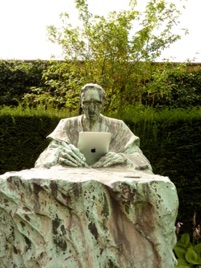KUL HIW Research Methods in Ancient and Medieval Philosophy Seminar 2017-18
Prof. Jan Opsomer KUL & Can Loewe KUL
Prof. Richard C. Taylor, Marquette UniversityA & KUL DWMC

KUL HIW Research Methods in Ancient and Medieval Philosophy Seminar 2017-18
Prof. Jan Opsomer KUL & Can Loewe KUL
Prof. Richard C. Taylor, Marquette UniversityA & KUL DWMC

Thomas Aquinas Fall 2014:
Theomorphism or Anthropomorphism? Conceiving God in Aquinas and his Arabic Sources
Prof. Richard C. Taylor, Marquette University, Milwaukee
(email: richard.taylor@hiw.kuleuven.be or Richard.Taylor@Marquette.edu)
Prof. Andrea Robligio, Katholieke Universiteit Leuven, Belgium
(email: Andrea.Robiglio@hiw.kuleuven.be)
Last website update 29 November 2013
Live Classroom Course Meeting Times*:
28 August - 18 September: Thursday 9:00 - 11:00 am U.S. Central Time
25 September - 18 December 9:00-11:00 am US Central Time / 16h-18h European Central Time
Brief Course Description
In recent years the powerful influence of the Arabic tradition on the development of the philosophical reasoning and insightful doctrines of Aquinas has been firmly established in international conference meetings and publications on Aquinas and ‘the Arabs’. In connection with that work, this course will begin with five weeks of a graduate introduction to Aquinas and then become an international collaborative graduate seminar with the subtitle, “Theomorphism or Anthropomorphism? Conceiving God in Aquinas and his Arabic Sources.” Team taught by professors at Marquette and the Katholieke Universiteit Leuven, this course will have assigned readings, video lectures, an online discussion board, student presentations (beginning in the sixth week), and weekly live video meetings for two hours of discussion involving students at Marquette and KULeuven as well as other selected international auditors. The content focus will be on issues, proofs, attributes, divine actions and more with particular reference to the initial (and often lasting) reasoning of Aquinas formed in connection with his use of ideas and arguments from the Arabic tradition. The course will close with four weeks of lectures on conceptions of God developed by later thinkers in engagement with the account of Aquinas. The structure of the course will follow the model found at https://academic.mu.edu/taylorr/Aquinas_Fall_2013_MU_KUL/Course_Description.html.
Marquette grading will be based on course participation (50%) and a final professionally prepared course paper of 20-25 pp. (50%).




KUL HIW Research Methods in Ancient and Medieval Philosophy Seminar 2017-18
location:
MSI 02.15
MSI1 Mgr. Sencie Instituut
Erasmusplein 2
3000 Leuven
The KUL HIW Research Methods in Ancient and Medieval Philosophy Seminar is a full year course largely focused on the issue of universals and knowledge. Somewhat of an exception, however, is made for class meetings after 29 September for the next five (5) weeks during which, sponsored by the U. S. Fulbright Commission, I will teach five (5) classes on the medieval Arabic philosophical tradition and the influence of it in translation on Thomas Aquinas and some other thinkers of the 13th century Latin tradition. This work is supported by the Fulbright Commission for the sake of advancing international and intercultural understanding. This is fully in accord with the goals of the international Aquinas and ‘the Arabs’ Project which I direct. (See AquinasAndTheArabs.org). In May & June of 2016 I taught on this topic at the Divinity School of Marmara University in Istanbul in classes for graduate students and professors. Here at KUL I will teach on this topic weekly from 29 September until 3 November and then follow the course via a Skype / Polycom live video connection for the rest of the academic year. In Spring 2018 I will again teach on this topic at the Università di Pisa for five (5) weeks. The result of this teaching and research in 2017-18 will be a book on Aquinas and the Arabic Philosophical Tradition.
Each of the five class meetings I will be leading is divided into two parts. In the first part we will examine key texts and doctrines of thinkers of the Arabic philosophical tradition (and in many cases their Greek antecedents) and in the second part we will delve into texts and teachings of Thomas Aquinas which are substantially influenced by his intensive study of philosophy from the Arabic tradition in Latin translation.
6 Oct 2017 Theories of Human Knowing and the Nature of Universals in the Arabic Philosophical Tradition and Their Importance for Aquinas
13 Oct 2017 The Nature of the Human Soul in the Arabic Philosophical Tradition and its Importance for Aquinas
20 Oct 2017 Ultimate Human Happiness in the Arabic Philosophical Tradition and its Importance for Aquinas
27 Oct 2017 Philosophy and Religion in the Arabic Philosophical Tradition and its Importance for Aquinas
3 Nov 2017 The Metaphysics of Being and Creation in the Arabic Philosophical Tradition and its Importance for Aquinas
This website is primarily concerned with the teaching of Prof. Taylor but other course information will be uploaded and provided following the first class meeting.

Désiré-Joseph Cardinal Mercier (1851-1926)
in the garden of the KUL Institute of Philosophy


al-Farabi Avicenna Averroes Aquinas Bonaventure Augustine